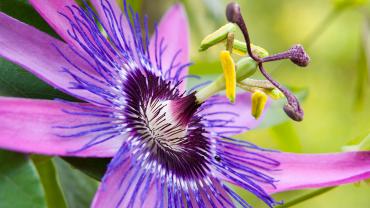
Passionflower (Passiflora incarnata) is a botanical used for both medicinal and culinary purposes. The aerial parts of this plant are primarily used to support human health. Passionflower contains many bioactive compounds, including alkaloids, phenolic compounds, and flavonoids. It is known for its role in support of mood, sleep, and the body’s response to psychological stress. Recent research has furthered our understanding of this health-supportive plant.
Certain constituents of passionflower have been studied for their influence on the human body. Although the extent of the passionflower’s impact on the body is not yet fully understood, certain phenolic compounds within passionflower are believed to act physiologically. Some of the flavonoids in passionflower are believed to have influence on the gamma-aminobutyric acid (GABA) pathway. Several animal studies have shown the partial GABA-A agonist qualities of flavonoids from passionflower. Laboratory studies have also indicated that other flavonoids may have affinities for benzodiazepine receptors.
A systematic review published by Janda and colleagues explored the potential supportive role of passionflower in the presence of certain neuropsychiatric conditions. One of the animal studies described in the review reported that long-term use of passionflower was correlated with increased motivation, improved motor activity, and reduced stress. Other studies explored passionflower for the support of memory function and sleep onset.
A placebo-controlled study described in this review indicates that small doses of passionflower infusions had potentially subjective short-term benefits for healthy adult participants. Only mild sleep-quality fluctuations were experienced. Sleep quality was measured by recorded sleep logs with an approved polysomnography technique. Participants received 250 mL of passionflower herbal tea for 7 days in the evening to avoid daytime drowsiness.
Several clinical studies also explored the potential calming role of passionflower in the preoperative setting. One study reported that individuals given passionflower supplementation before surgery had comparatively lower preoperative anxiety levels. Another study compared supplementation with melatonin and passionflower in individuals with presurgical status. Both interventions were reported to increase sedation scores and improve anxiety markers.
Vitexin is a flavonoid found in passionflower and other botanicals that has been researched for its potential neuroprotective and health-supportive roles. A review article published by Lima and colleagues explored the use of vitexin on the central nervous system. One study described that vitexin may modulate the formation and accumulation of amyloid-beta, a molecule associated with neurodegenerative conditions such as Alzheimer’s disease.
Another study created a simulation of Parkinson’s disease (PD) and found that vitexin modulated certain cellular actions and beneficial signaling pathways. In an animal model, it was shown to help symptoms associated with PD including bradykinesia and motor deficit loss. Other studies reported that vitexin influenced the pathways associated with neurogenesis.
Although more research is needed to determine the full potential of passionflower to support human health, current research suggests it may play a beneficial role in the body. Passionflower may support neurological health, the body’s response to stress, a healthy mood, and sleep quality.
By Colleen Ambrose, ND, MAT